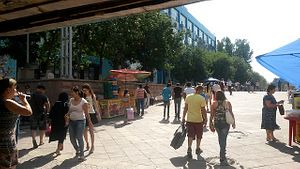In numerous international metrics systems, the states of Central Asia often trend together toward the lower rungs of the rankings. Transparency International’s Corruption Perceptions Index, for instance, sees all five Central Asian states come in among the bottom third globally. Reporters Without Borders’ Press Freedom Index, meanwhile, sees only Kyrgyzstan land within the top 100 nations, and only North Korea and Eritrea scoring worse than Turkmenistan.
As such, for those looking for some silver linings from the region, last week’s release of the UN’s Human Development Report, ranking jurisdictions by Human Development Index (HDI), was a welcome round of (relatively) good news for Central Asia. Melding a HDI score from a handful of metrics — average life expectancy, mean years of schooling, etc. — the latest report, which looks at data from 2015, places Central Asian developments in a far less deleterious light than rankings elsewhere.
Leading the Central Asian contingent in the rankings, unsurprisingly, is Kazakhstan. For the second year in a row, the UN has tabbed Kazakhstan as a country with a High Human Development, with the country coming in at 56th, tying with EU-member Bulgaria and landing just ahead of the Bahamas and Malaysia.
But while Kazakhstan was the lone Central Asian state ranked among the “High” countries last year, Astana now has company. While Uzbekistan came a good way behind, at 105th globally, tied with the Maldives, this is nine slots higher than Uzbekistan’s rankings from the year prior. Buoyed by increasing numbers across the board, it seems the recent, relative domestic thaw may not be the only good news greeting the country in 2017. Elsewhere, Turkmenistan comes in at 111th, a few slots lower than its prior position at 109th, while Kyrgyzstan and Tajikistan, at 120th and 129th, respectively, haven’t budged from last year’s rankings — and still come in ahead of India, which sits at 131st.
All told, this year’s numbers reflect broader regional trajectories, at least as it pertains to HDI: From 2010-2015, all five Central Asian states improved their rankings, from Kazakhstan leaping seven slots to Turkmenistan and Tajikistan moving up two spots apiece over the stretch. (Kazakhstan’s numbers, however, weren’t the most improved throughout the Asia-Pacific: China climbed 11 spots, and Mongolia jumped 8 slots.)
The numbers, of course, should be taken with a grain of salt — especially as Russia, despite roiling from the longest recession President Vladimir Putin has ever overseen, managed to jump into the “Very High Human Development” echelon in the new report. Still, for regional governments, the numbers are something of a welcome development, especially in comparison to international rankings elsewhere. While the full brunt of the recent economic slowdown hasn’t yet been fully factored in, Central Asian governments can at least point to the UN HDI report as evidence that — corruption and press clampdowns aside — region-wide silver linings can still be found.

































